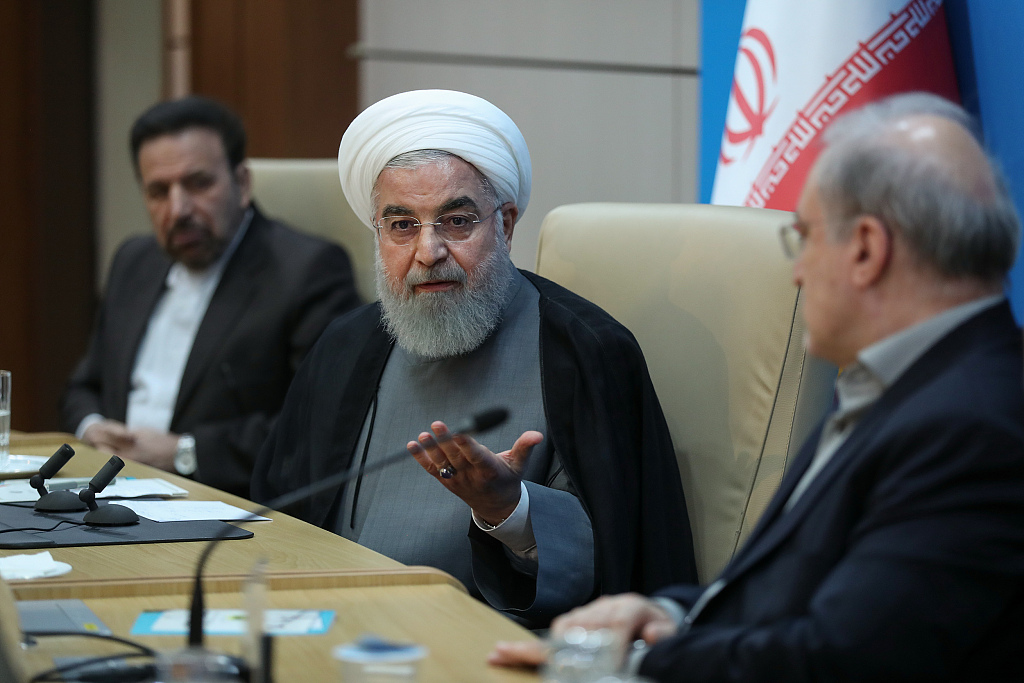Islamabad (People’s Daily) – Although tensions have been rising since the US withdrew from the Iran nuclear deal last year, the downing of a US drone by the Iranian forces and recent oil attacks near the Strait of Hormuz managed to escalate the situation to a new level, which observers eyed as the edge of war, with the fate of the fragile nuclear deal more in doubt than ever.

A handout picture provided by the Iranian presidency shows President Hassan Rouhani (C) during a meeting with healthy ministry officials in Tehran on June 25, 2019. (Photo:VCG)
“10 minutes away from war”
The world was “apparently 10 minutes away from witnessing a war on Iran,” claimed an opinion piece published in the Pakistani newspaper, the Dawn, on Wednesday, warning of “the danger of tensions spiraling out of control”.
The author was worried that “Donald Trump’s war cry has thrown geopolitics into a tizzy” and that the US-Iran conflict may “intensify the ongoing proxy war between Saudi Arabia and Iran” and lead to “a new civil war in the Middle East.”
Such fears are mounting and spreading around the globe, as the war cloud hangs over one of the world’s most crucial oil shipping lanes. Tensions have spiked after Iran’s Revolutionary Guard shot down a US drone last week and a series of attacks on tankers in the sensitive Gulf water.
It was reported by Reuters that Trump called off the US retaliatory air strikes at the last minute after the downing of its drone.
“I believe the escalation, sanctions on top of sanctions, provocations, the military build-up, is extremely dangerous because it could ignite the region, it could lead to over-reactions,” French President Emmanuel Macron said on Wednesday in Japan ahead of the G20 summit later this week, Reuters reported.
Tehran has repeatedly stated that it will not renegotiate the terms of the nuclear deal. The latest reiteration of the stance was made by Iranian President Hassan Rouhani late on Tuesday in a phone conversation with his French counterpart, according to the Tehran Times.
Despite saying that Iran “is not interested in escalating tensions and has never sought war with any country,” Rouhani warned that “the Iranian armed forces will respond firmly if the US seeks to violate Iran’s airspace and waters again”.
Rouhani also said that Iran will reduce its commitments phase by phase under the nuclear deal due to Europe’s lack of practical actions to preserve it.
Last week, Iran’s nuclear authority stated that the country will speed up uranium enrichment activities after the 60-day deadline, which it has given to European powers to work round the weighted US sanctions starting from May.
Fate of the nuclear deal
The UN Under-Secretary-General Rosemary DiCarlo said on Wednesday that “we are at a critical juncture,” referring to the future of the nuclear deal amid heated tensions in the Gulf, according to a press release on the official website of the UN.
The Iran nuclear deal, formally known as the Joint Comprehensive Plan of Action (JCPOA), was reached in 2015 between Iran and six world powers, namely China, Britain, France, Germany, Russia and the US. Under the JCPOA, Iran agrees to limit its nuclear program in exchange of the lifting of UN sanctions. The International Atomic Energy previously has stated in its latest report that Iran is implementing its commitments under the nuclear deal.
“It is essential that the Plan continues to work for all its participants, including by delivering tangible economic benefits to the Iranian people,” DiCarlo said.
She also said that US actions, referring to Trump’s decision in May to impose more sanctions on Iran especially on its oil trade, “may impede the ability of Iran and other member states to implement certain of its provisions”.
According to Iran’s Ambassador to the UN Majid Takht Ravanchi, the US withdrawal and re-imposition of sanctions had rendered the deal “almost fully ineffective”.
“Iran alone cannot, shall not and will not take all of the burdens anymore, to preserve the JCPOA,” the Iranian diplomat declared.
With Tehran running out of patience for an ambiguous European solution, it is becoming increasingly difficult to preserve what UN Secretary-General António Guterres regarded as a major success of “multilateralism, nuclear non-proliferation, dialogue and diplomacy,” stated the JCPOA.
The UN Ambassador for the European Union, Joao Vale de Almeida, warned that there was “no credible, peaceful alternative”.


